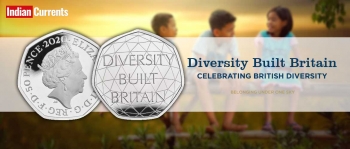
.png) Ram Puniyani
Ram Puniyani
The UK, Chancellor Rishi Sunak has unveiled (17/10/2020) 50 Pence 'Diversity coin’ to celebrate Britain’s diverse history and recognise the profound contribution minority communities have made to the shared history of the country. The coin carries the message “Diversity Built Britain”.
This is in the backdrop of the campaign led by ‘We too built Britain’ group. The release of the coin is the beginning of the series which will honour the country’s ethnic minorities. There can be a detailed elaboration as to how different ethnic minorities have lived and made Britain their home. A significant number of these are from South Asia, including India.
The real import of this is the backdrop of the thesis of ‘Clash of civilizations’ by Samuel Huntington, as per which the present era is the one where after the collapse of socialist Soviet union, the clash is along the lines of civilizations. Different religions will be in conflict as per this thesis. "It is my hypothesis that the fundamental source of conflict in this new World will not be primarily ideological or primarily economic. The great divisions among humankind and the dominating source of conflict, will be that the cultural. Nation states will remain the most powerful actors in world Affairs, but the principal conflicts of global politics will occur between Nations and groups of different civilizations. The clash of civilizations will dominate global politics. The fault lines between civilizations will be the battle lines of the future."
This theory dominated the global scene particularly in the aftermath of 9/11 attack on World Trade Centre. Osama bin Laden called 9/11 jihad and George Bush launching the attack on Afghanistan used the word Crusade, while Tony Blair, the then UK PM, attributed ‘divine reasons’ for the attacks on the countries of West Asia.
This theory did provide an ideological cover for the attacks on different countries by US and allies. It was primarily driven by lust for control over oil resources. The ‘Clash theory’ provided cover for the violations done by American axis always out to control global resources, earlier in form of direct colonization and now as imperialist forces, influencing global economy with an eye on oil resources. At ideological level the best response to this thesis came from the then President of India, Dr K.R. Narayanan, who stated that ‘civilizations don’t clash, it is barbarisms which clash’.
The United Nation at that time was led by Kofi Annan, who was the General Secretary. He went on to appoint a high level international committee, cutting across different religions and nations to come up with an understanding of the world today and to recommend the measures to restore the amity of civilizations, cultures and people of the of the World. The report (Mid Nov2006) (http://www.unaoc.org/repository/report.htm) is a landmark in more ways than one.This committee came out with a brilliant document, ‘Alliance of Civilizations’.
There is not much awareness about this global study, which aptly describes the role of migrations, building of nations by diverse communities through alliances at multiple levels.
Talking of India, diversity has been the hall mark of this society from long. Christianity entered India, right in the first century. Already different religious traditions, Jainism Buddhism were present here. Islam came in 7-8 Century from Malabar Coast through Arab traders and later many of those who were victims of Varna-Caste system embraced Islam through Sufi saints. The Muslim invaders coming from North West were more for reasons related to power and wealth. Buddhism had spread in various South East Asian countries. Indians also migrated to different parts of the World mostly for economic purpose, employment or greener pastures. UK has abundant number of them, Similarly America and Canada, now Australia has lot of migrants from India. Earlier many Indians did migrate to Caribbean’s, Mauritius, and Ceylon among other places.
The migrating communities have no monolithic approach in the countries of their migration. Most of them do maintain their nostalgia for the country of their origin, while relating to the societies of their migration in different ways. Today you will see a large numbers of Indians in West Asia, particularly in Gulf region. Here in India the sectarian elements uphold the Non Resident Indian’s nostalgia for India, they also look down upon minorities (Muslims and Christians) as foreigners. There is an infinite diversity within the Hindu fold itself. Indian culture has been a total mix of diverse sections of society, each contributing in their unique ways. All our Literature, Art, Architecture is a mix of contributions from multiple streams.
India’s diversity has been multi-factorial and at different layers. Different communities have been living and celebrating this diversity. Religious festivals have been one of the strong platforms for community interactions. In the area of religions Bhakti and Sufi traditions have upheld the diversity. While ‘melting pot model’ of cultural integration does apply partly, the main ex
In contrast to those who were part of national movement, the communal streams went for monolithic concepts, like ‘Urdu-Muslim-Pakistan’ and matching ‘Hindi-Hindu-Hindustan’. The leasers of freedom movement went on to uphold this diversity as a strength to coin phrases like ‘Unity in Diversity’. One of the paramount leaders of freedom Movement, Jawaharlal Nehru, went on to express the same as a celebration in his magnum opus, ‘Discovery of India’.
Today we do need to learn from the UK example where role of minorities is recognised, appreciated and upheld. One needs to give the similar acceptance for diversity, to pave the path of peace and progress.